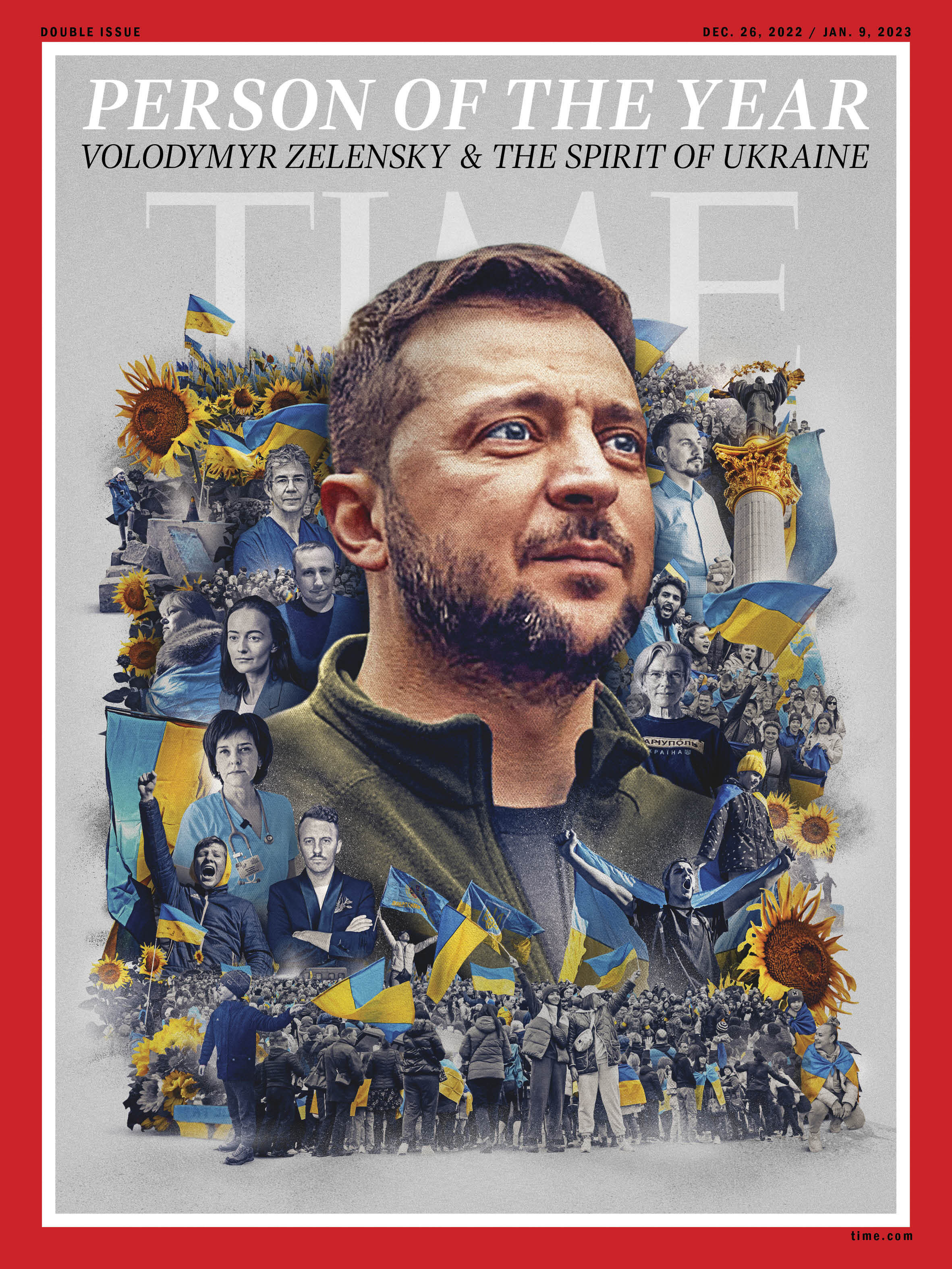The process of choosing the Person of the Year—who or what most influenced the events of the past 12 months, for good or for ill—can be agonizing. How could one person represent an entire year? Do we lean into the light, reach into the darkness, or land somewhere in between?
This year’s choice was the most clear-cut in memory. Whether the battle for Ukraine fills one with hope or with fear, Volodymyr Zelensky galvanized the world in a way we haven’t seen in decades. In the weeks after Russian bombs began falling on Feb. 24, his decision not to flee Kyiv but to stay and rally support was fateful. From his first 40-second Instagram post on Feb. 25—showing that his Cabinet and civil society were intact and in place—to daily speeches delivered remotely to the likes of houses of Parliament, the World Bank, and the Grammy Awards, Ukraine’s President was everywhere. His information offensive shifted the geopolitical weather system, setting off a wave of action that swept the globe.
In a world that had come to be defined by its divisiveness, there was a coming together around this cause, around this country that some outside it might not be able to find on a map. At the U.N., 141 countries condemned the invasion; only North Korea, Syria, Eritrea, and Belarus—dictatorships all—voted with Moscow. Major companies pulled out of Russia en masse, erasing billions in revenues. Financial, material, humanitarian, and military support came pouring in. Strangers took in refugees; restaurateurs fed the hungry; doctors flew in to help the wounded. Ukraine’s flag unfurled across social media; its colors, blue and yellow, lit up landmarks from Tokyo to Sandusky, Ohio.

The spirit of Ukraine was embodied by countless individuals inside and outside the country. Many fought behind the scenes, like Ievgen Klopotenko, one of Ukraine’s most famous chefs, known for his borsch, who provided over a thousand free meals a day to refugees in Lviv in the first weeks after the invasion. “If you have the opportunity to eat borsch, it means that you are alive,” he says. Chef José Andrés brought his World Central Kitchen, serving more than 180 million free meals. Dr. David Nott, a Welsh surgeon, has traveled multiple times to Ukraine to train local doctors in how to treat war wounds. Julia Payevska, a medic, treated wounded civilians, day and night, in besieged Mariupol, as well as a wounded enemy soldier—footage of which helped her get released after three months of imprisonment by Russian troops.
All the while, journalists risked their lives to tell these stories. “The challenge is to find a way to talk about it so that the world continues to care,” says Olga Rudenko, the editor of the Kyiv Independent.
Zelensky has been laser-focused on keeping the world’s eyes on Ukraine. The former entertainer understood innately that attention is the planet’s most valuable currency and all but cornered the global market. He did this through meticulous image-building and repetition in his message. He was blunt, sometimes sarcastic, and always directly to the point: we must save Ukraine to save democracy. In an alternate reality where someone else had been leading Ukraine, there might or might not be a Russian flag flying over the parliament building in Kyiv. There would almost certainly still be a McDonald’s near Moscow’s Red Square, that symbol of post-Cold War globalization. Zelensky’s command of the weapons of the digital age meant that business leaders and politicians everywhere were forced to take notice and take a stand, whether they liked it or not.
Buy a print of TIME’s Person of the Year, featuring Volodymyr Zelensky and the Spirit of Ukraine
Zelensky has earned his share of criticism. His decision to downplay the threat of invasion, including failing to share with his fellow citizens U.S. intelligence that it was imminent, infuriated many in his country. The cavalcade of visiting celebrities and fashion magazine shoots are calculated to keep attention on the crisis but can at times seem out-of-touch amid the killing. Others question whether he is committed enough to liberating his country from Vladimir Putin’s terror without also triggering World War III. Zelensky himself acknowledges it is too early to say whether his efforts will lead to success. “Later we will be judged,” he tells TIME’s Simon Shuster, in a two-hour conversation on the President’s railcar en route to Kyiv from a visit to newly liberated Kherson. (Perhaps no reporter has spent more time with Zelensky and his inner circle this year than Simon, a source of great insight for TIME’s readers.)
The impact of this story on 2022 is the essence of what Person of the Year was designed to capture, the idea that fateful events on the global stage are shaped—for better and worse—by the talents, priorities, fears, and foibles of individual human beings. “I didn’t vote for him,” Alona Shkrum, a member of parliament from an opposition party, says of Zelensky. But she adds, “We owe him the fact that we survived.”
For proving that courage can be as contagious as fear, for stirring people and nations to come together in defense of freedom, for reminding the world of the fragility of democracy—and of peace—Volodymyr Zelensky and the spirit of Ukraine are TIME’s 2022 Person of the Year.